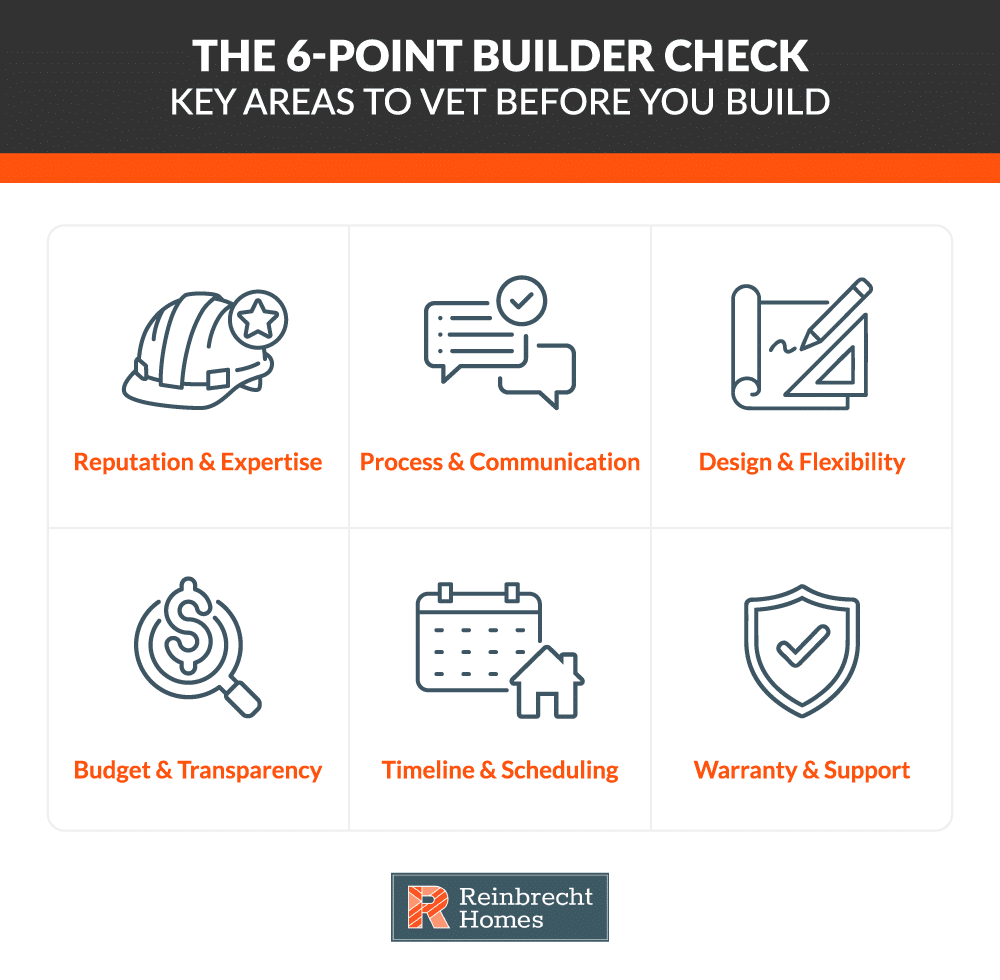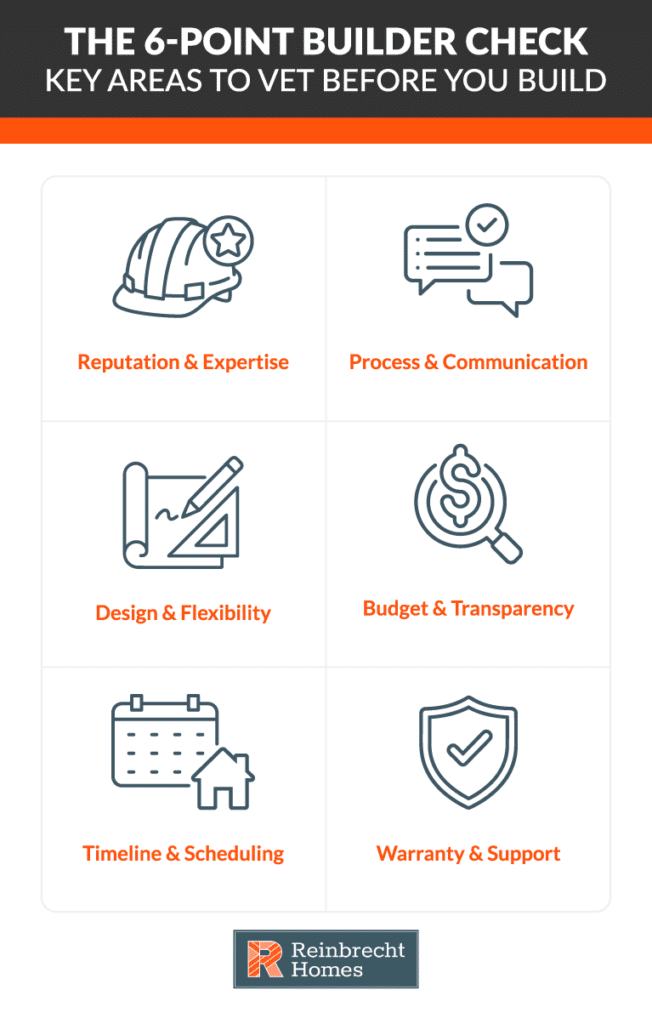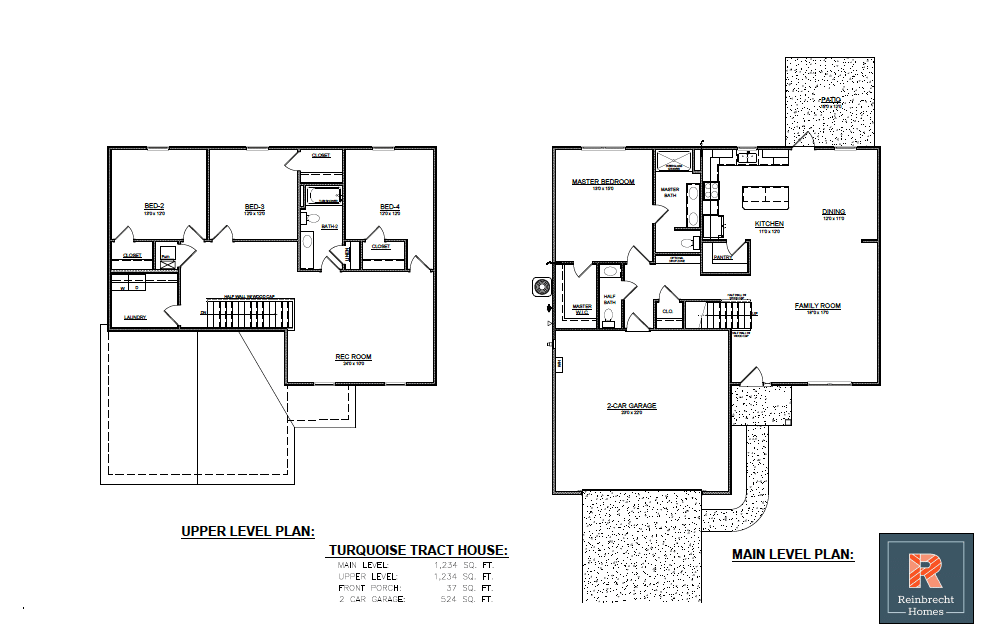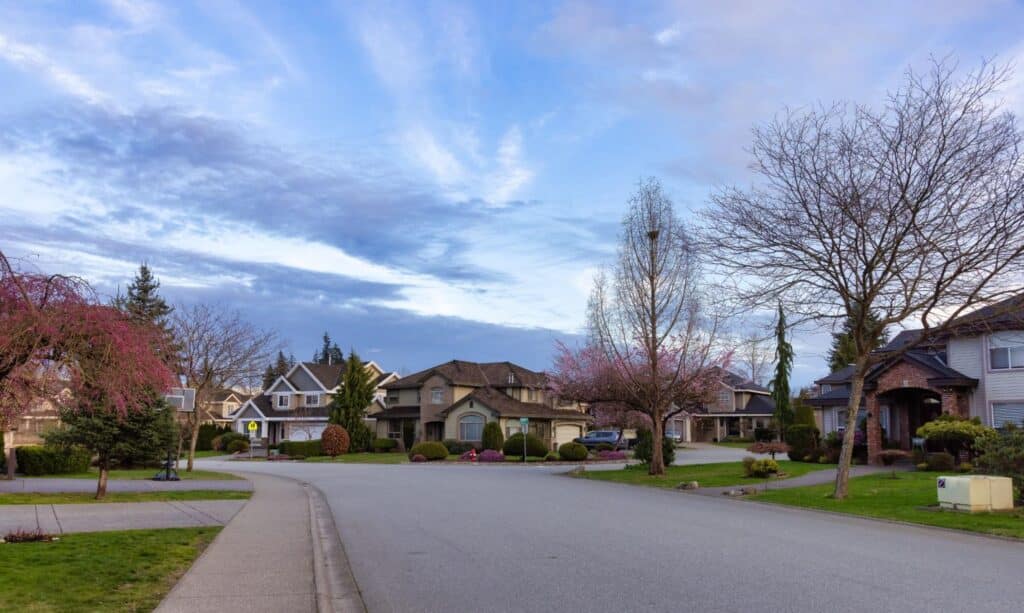Building your dream home is an exciting milestone—whether your vision includes a fully custom design or a personalized semi-custom layout. However, turning that dream into reality depends on choosing the right home builder and asking the right questions from the start. This guide, tailored for individuals and families in Southern Indiana and Eastern Illinois, highlights the most important questions to ask your home builder. By understanding the critical aspects of the homebuilding process, you can avoid surprises, set clear expectations, and make informed decisions that shape your new living space.
Starting with the right questions lays the groundwork for a successful project. Inquiring early about timelines, budgeting, and customization options helps establish clear expectations. This open dialogue fosters trust, minimizes misunderstandings, and enables prompt resolution of any issues.
With a clear understanding of your builder’s approach, you can remain proactive during each phase and ensure that your vision is consistently at the forefront. Whether you’re a first-time homebuyer or have previous experience, these questions will empower you to navigate the process with clarity and confidence.


Questions About the Builder’s Experience and Expertise
Selecting the right builder is key to your project’s success. Consider asking:
How long have you been in the homebuilding business?
A builder’s experience signals their expertise in handling diverse projects and addressing challenges. Inquire about their years in business and whether they have handled projects similar to yours. Regional experience is valuable too—it means the builder understands local regulations, materials, and trusted subcontractors.
What types of homes do you specialize in?
Builders often focus on custom homes, semi-custom builds, or move-in-ready options. Knowing their specialization helps determine if they align with your vision. If you desire full creative control, ensure the builder has a strong track record in custom construction; if you prefer a streamlined process, a builder experienced in semi-custom or available homes might be ideal.
Can you provide client testimonials or examples of past projects?
Request client testimonials, project galleries (if available), or tours of model homes. Reviews of past work reveal the builder’s quality, reliability, and ability to stick to deadlines. Hearing feedback from previous clients offers further insight into their performance and customer service.
What professional accreditations or memberships do you hold?
Credentials and industry memberships, such as the Indiana Builders Association, and indicate a commitment to quality and ongoing education. Ask about any certifications or affiliations that underscore their adherence to best practices and ethical standards, which can translate into a higher quality build for your home.
Questions About the Homebuilding Process
Understanding the builder’s approach can streamline your experience:
What is your approach to new home construction and customization?
Request a clear outline of the process—from initial design discussions to final walkthroughs. Clarify how decisions regarding finishes and design options are managed and whether you will be involved in selecting materials and features at each phase.
What are the main milestones and how will progress be communicated?
Ask for a breakdown of key project stages (e.g., foundation, framing, finishing) and how frequently you can expect updates. Understanding the communication method—whether through regular meetings, emails, or project management tools—ensures you stay informed.
How do you handle permits and compliance with local building codes?
Confirm that the builder manages permits and adheres to regional codes. Builders familiar with Southern Indiana and Eastern Illinois will know the unique requirements and challenges, reducing the risk of delays.
Questions About Floor Plans and Customization Options

Your home’s layout impacts both functionality and style. Consider asking:
What floor plans do you offer, and can I tour them?
Discover if the builder maintains a portfolio of standard floor plans and whether you can tour model homes. This helps you understand the available options and the design quality the builder delivers.
To what extent can I customize a standard floor plan?
Determine how much flexibility you have in modifying existing designs. Ask if you can alter room dimensions or adjust elements like window placement and finish choices, and whether such changes affect the timeline or costs.
Can I incorporate specific materials or features?
If you have particular preferences—such as hardwood flooring or specialized fixtures—confirm that the builder can source these materials and integrate them into your design without compromising the budget or schedule.
How do you help clients decide between available, semi-custom, and fully custom homes?
A knowledgeable builder will guide you through the pros and cons of each option. They should explain how each model fits your lifestyle, budget, and time constraints, helping you choose the best path for your project.
Questions About Building Costs and Financing
Budget management is vital. Ask the following to ensure transparency:
What is the estimated cost to build my home, and what does this include?
Request an itemized estimate that clearly outlines expenses such as labor, materials, permits, and site work. Understanding whether the price is fixed or subject to change helps set realistic expectations.
Are there potential hidden or additional costs I should anticipate?
Talk about any extra expenses—such as site preparation, utility connections, or upgrades that may not be covered in the initial estimate—to avoid surprises later.
Do you offer home financing solutions, such as free construction loans?
If financing is a concern, ask whether the builder partners with local lenders or provides specific financing options. This can streamline your home buying journey and may offer financial advantages.
How do you handle cost changes during construction, and will I receive regular updates?
Clarify the process for managing changes due to material cost fluctuations or design modifications. Ensure the builder commits to providing timely updates and obtaining your approval before implementing any changes.
Questions About Timeline and Scheduling
A clear construction timeline helps you coordinate your personal plans with the builder’s schedule:
What is the expected timeline for completing my home?
Ask for an estimated duration based on past projects and a breakdown of major phases. Knowing the projected timeline helps plan significant milestones, such as move-in dates.
How do you address delays caused by weather, supply issues, or other factors?
Find out how the builder plans for and communicates delays. Builders who are proactive about potential setbacks will help you adjust expectations and maintain overall progress.
Will I receive regular updates on the schedule, and how often?
Confirm the frequency and format of status updates so you can remain informed throughout the construction process. Consistent communication minimizes uncertainty and builds trust.
How can I align my personal schedule with the construction timeline?
Discuss how key decisions and milestones—like finish selections—fit into the timeline. Clear planning on both sides helps keep the project on track and reduces potential conflicts.
Questions About Warranty and Post-Construction Support
Your builder’s responsibility extends beyond just completing construction. Ask:
Do you offer a homebuyer’s warranty, and what does it cover?
Request details on warranty coverage, including duration and specific areas (structural components, systems, finishes) that are protected. A solid warranty protects your investment and offers peace of mind.
What type of post-construction services do you provide?
Understand what follow-up visits or inspections are offered after you move in. Reliable builders schedule walkthroughs and are available to address any minor issues that may emerge once the home is occupied.
How do you handle repairs or concerns after construction is complete?
Ask about the process for reporting issues, the expected response time, and whether additional repairs are covered under warranty or billed separately.
Do you provide any guarantees on long-term quality or maintenance advice?
A builder who stands by their work may offer guarantees on key elements of the home and provide maintenance tips to help preserve your investment.
Questions About the Neighborhood and Location Options

Location plays a crucial role in your overall satisfaction. Consider these questions:
What neighborhoods or developments do you build in within Southern Indiana and Eastern Illinois?
Ask about the areas where the builder works. Whether the focus is on planned communities or private lots, understanding the setting helps ensure it meets your lifestyle and future growth expectations.
What factors should I consider when choosing a neighborhood?
Inquire about nearby amenities, commute times, school quality, and community features. The builder’s perspective can reveal benefits or drawbacks you might not have considered.
Are the neighborhoods designed for specific lifestyles?
Learn whether the communities cater to families, retirees, or professionals. Knowing the demographic and community features helps you choose a setting that aligns with your personal needs.
What amenities, schools, and local features are in the area?
Request an overview of services and amenities—such as parks, shopping, and healthcare—so you can decide if the location supports your long-term plans.
Questions About Sustainability and Energy Efficiency
As awareness of environmental impact grows, sustainable building practices are an increasingly important aspect of home construction. Consider asking:
Do you incorporate energy-efficient materials or eco-friendly materials into your builds?
A builder committed to sustainability may integrate renewable materials, energy-efficient windows, or solar-ready systems into home designs. Understanding these practices ensures the home benefits from long-term savings on utility costs and reduces its environmental footprint.
What options are available for enhancing the energy efficiency of my home?
Ask whether there are different packages or upgrades available to boost energy performance. Builders might offer options such as improved insulation, high-efficiency heating and cooling systems, or smart home technologies that monitor and optimize energy use.
How do you stay updated with green building standards and certifications?
Inquire if the builder follows guidelines from recognized organizations or holds certifications related to sustainable construction. This indicates an ongoing commitment to environmentally responsible practices.
Can you provide past examples of energy-efficient homes you have built?
Reviewing specific cases where sustainable methods were employed can provide insight into the tangible benefits you might expect. It also underscores the builder’s ability to balance quality with innovation and environmental responsibility.
Additional Considerations for a Smooth Homebuilding Experience
Before finalizing your decision, take additional steps to further evaluate your potential builder. Arrange one-on-one meetings or site visits where you can observe ongoing projects. During these interactions, assess the clarity of communication, the builder’s responsiveness to concerns, and their willingness to provide detailed explanations. Such proactive inquiries help identify any discrepancies in their process and ensure that every aspect of your project is managed professionally. This careful approach builds confidence and secures a more satisfying homebuilding experience.
Red Flags to Watch For When Choosing a Home Builder
Even with the right questions, certain warning signs can reveal potential issues. Be attentive to:
Lack of Clear Communication
A builder who is vague about timelines, costs, or processes may not deliver the transparency you need to feel comfortable throughout your project. Consistent and detailed communication is critical.
Insufficient Client References or Portfolio
If a builder is reluctant to provide references or examples of completed projects, this could be a signal to probe further. A reputable builder will readily share evidence of their work and customer satisfaction.
Overpromising and Underwhelming
Beware of promises that seem too good to be true. Unrealistically short timelines, overly competitive pricing without clear breakdowns, or guarantees without substance can indicate future challenges.
Limited Flexibility with Customization
If the builder appears resistant to making adjustments or does not encourage input during planning, you might face challenges later in achieving the personalized design you envision. Flexibility should be a hallmark of a trustworthy homebuilder.
Ensuring a Seamless Transition from Vision to Reality
Building a home is about creating a space that reflects your needs, lifestyle, and aspirations. By asking the right questions, you ensure a process marked by clear communication, transparency, and well-informed decisions. Whether your focus is on custom homes, semi-custom designs, or available homes, this guide provides the insight you need to choose a builder who aligns with your vision.
At Reinbrecht Homes, we are dedicated to turning your dream into reality through a collaborative and transparent process. If you have any questions about homebuilding or want to explore your options, contact our team today to begin your journey. Your perfect home awaits—let’s build it together.

